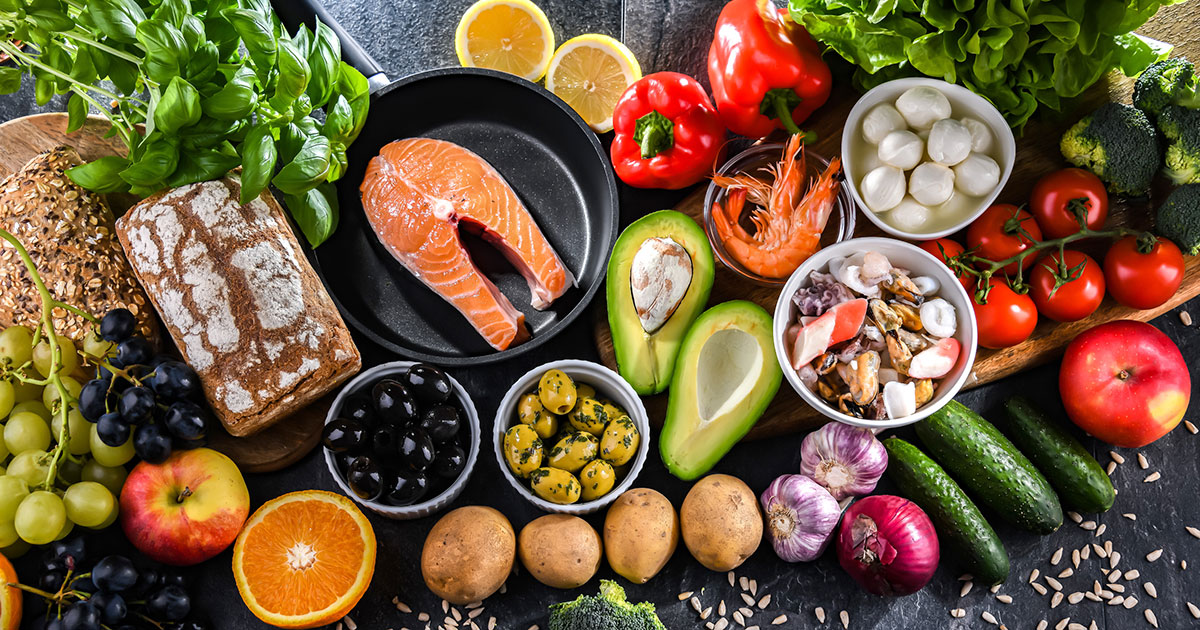
There's no such thing as an anti-cancer diet. But that doesn’t stop people from searching for one on the internet. Those looking to lower their cancer risk and cancer survivors or patients hoping to prevent a cancer recurrence or improve their treatment outcomes are hungry for reliable information about the best diet.
“During a time when patients feel they have little control over their bodies, they do have control over what they put into their mouths, and are often willing to make healthy changes,” says Kara Sonntag, RD, Clinical Dietitian at City of Hope®. “Some people are more comfortable making small changes over several months, and others want to rip off the band-aid. What’s important is finding an approach you’re able to stick with.”
Research shows the nutrients in the popular Mediterranean diet may help lower cancer risk, boost treatment effectiveness for patients and even prevent a recurrence. The Mediterranean diet is recognized as the best diet overall by U.S. News and World Report and is considered one of the easiest to follow over the long term. Dietitians and nutritionists often recommend a Mediterranean-style diet, which aligns with American Institute for Cancer Research (AICR) guidelines, to cancer patients as part of an overall healthy lifestyle. Research supports this recommendation.
A 2017 review of studies concluded that a Mediterranean-style diet may help reduce the risk of several cancers, including:
If you’ve been diagnosed with cancer and are interested in a second opinion on your diagnosis and treatment plan, call us or chat online with a member of our team.
While researchers can’t say conclusively that the Mediterranean diet is an anti-cancer diet, AICR states there’s evidence that it reduces the risk of weight gain and obesity. That’s important because 40 percent of all cancers in the U.S. are linked with obesity.
“The most important diet approach helps people achieve and maintain a healthy body weight given that obesity increases the risk of 13 different types of cancers,” says Carolyn Lammersfeld, MS, MBA, VP Clinical Services and Integrative Oncology at City of Hope. “Plant-based foods may also have direct effects on protecting the DNA in our cells from damage that can lead to the development of cancer.”
In this article, we’ll discuss:
- Is there a diet to prevent cancer?
- What’s the Mediterranean diet?
- How to eat the Mediterranean way
- Benefits of the Mediterranean diet plan
- Is there a specific diet for cancer survivors?
If you’ve been diagnosed with cancer and are interested in a second opinion on your diagnosis and treatment plan, call us or chat online with a member of our team.
Is there a diet to prevent cancer?
Thousands of dietary studies have been conducted trying to establish links between the foods we eat—or don’t eat—and cancer.
“The challenge is that most of the studies in this area are observational, so they don’t show cause and effect” says Lammersfeld.
Sonntag agrees: “They depend on people reporting what they eat, and that may not always be accurate.”
Yet there’s enough data to support specific diet and lifestyle approaches that reduce the risk of cancer death and the risk of for developing certain types of cancer. Here are a few examples:
A Harvard study published in August 2023 showed that following a Mediterranean diet may lower your risk of dying from any type of cancer by 28 percent. It’s the first study of its kind to find a link between action and outcome.
A hospital study published in March 2023 of 150 Iranian women found that postmenopausal women who followed a Mediterranean diet lowered their risk of breast cancer by as much as 77 percent.
A long-term study of 120,852 men and women whose eating habits were followed for 20 years concluded that eating a Mediterranean diet may reduce the risk of lung, postmenopausal breast, esophageal and stomach cancers.
In all three studies, participants self-reported their eating habits. While the outcomes may be valid and encouraging, more research is needed. Until then, mounting evidence indicates following a Mediterranean or other plant-based diet may reduce your risk for developing cancer and offer additional health benefits.
What’s the Mediterranean diet?
The Mediterranean diet was inspired by the eating habits of people living near the Mediterranean Sea, especially residents of Greece and Italy. Since not everyone eats the same foods in these regions, it’s considered more of a style of eating than a diet plan. It’s also evolved over the last few decades, but the basic guidelines remain the same.
Today’s Mediterranean diet emphasizes:
- Meals that consist of three main food groups: vegetables, fruits and whole grains. One or two servings of fruit and two or more servings of vegetables per meal is the norm, with at least one serving of each served raw.
- Eating fish at least twice weekly and other proteins, including poultry, eggs and dairy (cheese or yogurt) in small portions either daily or a few times a week.
- Limiting red meat consumption to a few times a month.
- Using healthy fats and oils for cooking and as part of meals. Olive oil is recommended for cooking and marinating. Foods naturally containing healthy fats, such as avocados, nuts and salmon, are also part of Mediterranean-style menus.
- Preparing dishes with a variety of spices and herbs that are good sources of micronutrients. Depending on the region, spices may include basil, chive, cumin, fennel, garlic, oregano, parsley, rosemary, tarragon, thyme and sage as well as spice blends like za’atar.
- Snacking on olives, nuts and seeds since these are good sources of healthy lipids, proteins, vitamins, minerals and fiber.
- Drinking water as the main beverage (six to eight glasses a day) but allowing a moderate consumption of wine with meals. Moderate drinking consists of no more than two servings (the equivalent of a beer, glass of wine or single-shot cocktail) per day for men, and one serving per day for women.
It’s important to note that AICR states: “There is no ‘safe’ amount of alcohol that does not increase risk of at least some cancers. For women with a history of breast cancer, alcohol has been associated with an increased risk of recurrence in some, but not all, studies.” Lammersfeld adds: “For patients in treatment, we recommend avoiding alcohol, as it may increase the risk of side effects. We also recommend that patients talk with their oncologist or care team. After treatment, the rule of thumb is if you don’t drink, don’t start. If you do drink, do so only in moderation.”
How to eat the Mediterranean way
The Mediterranean way of eating is all about the types of foods you eat and not about counting calories or sticking to a strict diet regimen. If you’re overweight or obese, you’ll shed pounds but don’t expect it to happen overnight. Even if you don’t need to lose weight, it’s a well-rounded way to eat nourishing foods.
“It’s not one diet or one approach,” says Sonntag. “You get to personalize it to your needs and preferences.” Sonntag suggests writing out a priority list of changes you’re willing to make, and then implementing them one or two at a time.
Initially, you’ll want to focus on the 10 strategies that follow.
Eating more fruit and vegetables. Strive for two to three servings of fruit and four or more servings of vegetables per day. A serving is one medium piece of fruit, one cup of raw vegetables or two cups of raw leafy greens. To avoid digestive issues, especially if you’re currently in treatment, you may need to work up to this amount of daily fiber slowly. If you do experience nausea or diarrhea, reduce the number of servings per day.
Choosing whole grains. Opt for whole-grain bread, cereal and pasta. Try experimenting with other whole grains, such as quinoa. Read nutrition labels as a guide for how much of a product is in one serving.
Getting your fat from plants. For example, replace butter with olive, canola, safflower or sunflower oil in cooking. On breads, try nut or seed spreads.
Mixing up your proteins. Eat fish or shellfish two to three times a week, poultry two times per week, and eggs two to four times per week. One protein serving is around three to five ounces for adults. That's about the size of a deck of cards. Fresh or water-packed tuna, salmon, cod, haddock and whitefish are healthy choices. Avoid fried fish and seafood if you’re watching calories.
Adding nuts to your diet. Strive to eat four servings of raw, unsalted nuts per week. One serving is about one quarter of a cup.
Switching to low-fat dairy. Good choices include skim or 1% milk, low-fat cottage cheese, low-fat cheese and low-fat Greek or plain yogurt. One serving is about the size of a half dollar.
Additionally, try to cut out or replace these following foods and beverages in your diet.
Red and processed meat. There’s compelling evidence that eating red or processed meat causes colorectal cancer. If you eat meat, make sure it's lean and keep portions small. Before you cook it, remove any fat you can see.
Sugary soft drinks. Drink water and unsweetened drinks, including plain tea or coffee.
Sweets and bakery items. Cakes, pies, cookies, doughnuts and candy are all linked to weight gain and obesity. It’s ok to treat yourself occasionally but watch portion sizes and consider sharing that special occasion dessert with a friend.
Salty and highly processed foods. Garlic, onions, herbs and spices should be used to enhance flavor instead of salt. Avoid junk foods and snack on raw nuts or fruit instead.
Benefits of the Mediterranean diet plan
Most people benefit from following a Mediterranean style of eating.
“A diet with this foundation is high in fiber, healthy fat, protein, vitamins, minerals and other beneficial nutrients,” explains Lammersfeld. “If done correctly, a Mediterranean diet may be lower in calories, sodium, added sugars and saturated fat than other diets. People primarily achieve their protein goals by consuming beans, peas, lentils and nuts which, in turn, helps limit less healthy fats, like red meat.”
According to a comprehensive study called the Impact of Mediterranean Diet on Chronic Non-Communicable Diseases and Longevity, this way of eating may reduce the risk for developing many cancers, as well as:
- Lower cardiovascular disease and its risk factors, including high cholesterol and high blood pressure
- Prevent and/or help manage type 2 diabetes
- Slow cognitive decline
- Reduce the risk of stroke
- Reduce inflammation and pain associated with arthritis
- Reduce the risk of neurodegenerative diseases, chronic respiratory chronic diseases, hip fractures and depression
It’s important to note that the Mediterranean diet stands apart from other plant-based diets in that it also incorporates lifestyle practices including adequate sleep. physical exercise and social interaction (often through preparing and eating meals with friends and family members).
Though more research, eating the Mediterranean way has shown to have a positive role on overall health and longevity.
Is there a specific diet for cancer survivors?
The recommendations for healthy eating are the same for cancer survivors as for patients recently diagnosed or in treatment, says Sonntag.
“AICR recommends following the same diet guidelines to reduce the risk of cancer recurrence as it does to reduce the risk of primary cancer occurrence if you are able and your care team agrees,” she says.
Lammersfeld agrees and adds: “It’s important to keep in mind that the majority of Americans eat too much sugar and not enough fruits and vegetables, so any approach that changes that equation may help reduce the risk of many cancers.”
If you’ve been diagnosed with cancer and are interested in a second opinion on your diagnosis and treatment plan, call us or chat online with a member of our team.


